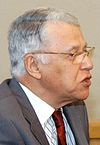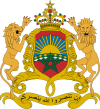- Moroccan parliamentary election, 2007
-
Moroccan parliamentary election, 2007 
2002 ← 7 September 2007 → 2011 All 325 seats to the Assembly of Representatives of Morocco
163 seats were needed for a majorityFirst party Second party Third party 


Leader Abbas El Fassi Abdelillah Benkirane Mohand Laenser Party Istiqlal Party Justice and Development Party (Morocco) Popular Movement Last election 48 42 27 Seats won 52 46 41 Seat change  4
4 4
4 14
14Popular vote 494,256 503,396 426,849 Percentage 10.7% 10.9% 9.3% Swing  4.07%
4.07% 2.02%
2.02% 0.99%
0.99%
Prime Minister before election
Elected Prime Minister
Morocco 
This article is part of the series:
Politics and government of
MoroccoConstitutionMonarchyGovernmentJudiciaryDivisions- Administrative divisions
- Regions
- Provinces
- Wilayas
Elections- Elections: 2002, 2007, 2011
- Political parties
Foreign policy
Parliamentary elections were held in Morocco on 7 September 2007,[1] the second of King Mohammed VI's reign. Voter turnout was estimated to be 37%, the lowest in Moroccan political history.[2] There were 33 different parties and 13 independent candidates competing for 325 assembly seats. An amount of $61 million was allocated by the Moroccan government to organize the 2007 elections.[3]
The number of constituencies was increased from 91 to 95 before this election.[4] Interior minister Chakib Benmoussa claimed the changes were made "in accordance with objectivity and transparency."[4] However, BBC correspondent Richard Hamilton accused the government of gerrymandering in order to prevent the Justice and Development Party from winning.[5] Professor Malika Zeghal of Harvard University agrees.[6]
According to many analysts the complex voting system makes it almost impossible for any group to win an outright majority, although others have disagreed with this view, arguing that the electoral system is not particularly unusual and should favor large parties.[1]. Whatever the outcome, real power will remain with the king, who is executive head of state, military chief and religious leader. [7]
For the first time in the history of elections in Morocco, they are being monitored by foreign observers including the U.S.'s National Democratic Institute for International Affairs and 42 others.[3]
Turnout in the election was only 37% - the lowest in the history of Moroccan national elections. The Socialist Union of People's Forces (USFP), the largest party in the outgoing government lost nearly a quarter of its seats, and was replaced as the largest party by its coalition partner, the Istiqlal Party. The main gainers were the pro-government liberal People's Movement and Constitutional Union parties. The opposition Islamist Justice and Development Party had a modest increase in its tally as did the pro-government leftist Party of Progress and Socialism.
Following the election the USFP was expected to leave the governing coalition.[8] Istiqlal Party leader Abbas El Fassi became PM on 19 September 2007.
Results
Summary of the 7 September 2007 Assembly of Representatives of Morocco election results Parties Votes % Seats +/- Independence Party (Hizb al-Istiqlal/Parti d'Independence) * 494,256 10.7 52 +4 Justice and Development Party (Parti de la Justice et du Développement) 503,396 10.9 46 +4 Popular Movement (Mouvement Populaire) * 426,849 9.3 41 +14 National Rally of Independents (Rassemblement National des Indépendents) * 447,244 9.7 39 –4 Socialist Union of Popular Forces (Union Socialiste des Forces Populaires) * 408,945 8.9 38 –12 Constitutional Union (Union Constitutionelle) 335,116 7.3 27 +11 Party of Progress and Socialism (Parti du Progrès et du Socialisme) * 248,103 5.4 17 +6 PND–Al Ahd Union (Union PND–Al Ahd)
× Joint list
× National Democratic Party (Parti National-Démocrate)
× Covenant Party (Parti Al Ahd)253,816
139,688
56,176
57,9525.5
3.0
1.2
1.314
8
3
3–3 Front of Democratic Forces (Front des Forces Démocratiques) 207,982 4.5 9 –3 Democratic and Social Movement (Mouvement Démocratique et Social) 168,960 3.7 9 +2 PADS–CNI–PSU Union (Union PADS–CNI–PSU)
× Joint list
× National Congress Party (Parti du Congrès National Ittihadi)
× Democratic Socialist Vanguard Party (Parti de l'Avant-garde Démocratique Socialiste)
× United Socialist Party (Parti socialiste unifié)148,011
98,202
25,695
3,761
20,3533.2
2.1
0.6
0.1
0.46
5
1
—
—+5 Labour Party (Parti Travailliste) 140,224 3.0 5 +5 Environment and Development Party (Parti de l'Environnement et du Développement) 131,524 2.9 5 +3 Party of Renewal and Equity (Parti de Renouveau et de l'Équité) 83,516 1.8 4 +4 Socialist Party (Parti Socialiste) 67,786 1.5 2 +2 Moroccan Union for Democracy (Union Marocaine pour la Démocratie) 76,795 1.7 2 +2 Citizens' Forces (Forces Citoyennes) 31,207 0.7 1 –1 Alliance of Liberties (Alliance des Libertés) 34,801 0.8 1 –3 Citizenship and Development Initiative (Initiative Citoyenneté et Développement) 50,278 1.1 1 +1 Party of Renaissance and Virtue (Parti de la Renaissance et de la Vertu) 36,781 0.8 1 +1 Reform and Development Party (Parti de la Réforme et du Développement) 47,141 1.0 0 –3 Moroccan Liberal Party (Parti Marocain Libéral) 46,526 1.0 0 –3 Democratic Independence Party (Parti Démocratique et de l'Indépendance) 31,105 0.7 0 –2 Action Party (Parti de l'Action) 24,384 0.5 0 ±0 Social Centre Party (Parti du Centre Social) 22,826 0.5 0 ±0 Party of Hope (Parti de l'Espoir) 16,376 0.4 0 ±0 Party of al-Badil al-Hadari (Parti d'al-Badil al-Hadari) 15,600 0.3 0 ±0 Democratic Socialist Party (Parti Socialiste Démocratique) 10,973 0.2 0 –6 Renaissance Party (Parti Annahda) 10,156 0.2 0 ±0 Party of Liberty and Social Justice (Parti de la Liberté et de la Justice Sociale) 5,452 0.1 0 ±0 Others 1.7 5 +5 Total (turnout 37%) 325 Source: MAP * Members of the outgoing coalition government External links
- Official 2007 elections website (Arabic) and (French)
- Political leaflets from the 2007 elections
References
- ^ Electoral Calendar Maximiliano Herrera
- ^ Morocco nationalists in poll win BBC News, 9 September 2007
- ^ a b "Morocco votes in parliamentary poll". AlJazeera.net. http://english.aljazeera.net/NR/exeres/1F7F842E-BDC5-4603-92E5-1BB21EA1B2AE.htm. Retrieved 2007-09-07.
- ^ a b Morocco's electoral constituencies increased to 95 People's Daily, 24 August 2007
- ^ Morocco poll - choice or façade? BBC News, 1 September 2007
- ^ Malika Zeghal. Islamism in Morocco: Religion, Authoritarianism, and Electoral Politics. Markus Wiener Publishers. p. 260. http://books.google.ca/books?id=4rE-ZcjiNhgC&pg=PA260&lpg=PA260&dq=moroccan+election+gerrymandering&source=bl&ots=Bt87-lCPLi&sig=9vgGspmfgweHohMvl4C9rDmH5Ic&hl=en&ei=0QTzTJ3qOZG0nger6bSzCg&sa=X&oi=book_result&ct=result&resnum=3&ved=0CCQQ6AEwAg#v=onepage&q=moroccan%20election%20gerrymandering&f=false.
- ^ Morocco conservatives win most assembly seats, Reuters South Africa, September 9, 2007.
- ^ Moroccan elections bring victory for conservatives, Magharebia, 2007-09-10, accessed on 2007-09-12
 Elections and referendums in Morocco
Elections and referendums in MoroccoParliamentary elections Referendums Categories:- 2007 elections in Africa
- Elections in Morocco
- 2007 in Morocco
- Administrative divisions
Wikimedia Foundation. 2010.
